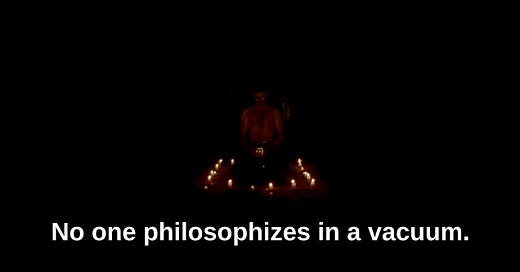Shall I Compare Thee: Some Considerations for Comparative Philosophy
No one philosophizes in a vacuum. When one engages in philosophy, the subjects they turn their attention to, the kinds of questions they ask, and the way they try to answer them are, rather obviously, influenced by a host of factors: for example one’s upbringing, language, academic tradition, to name but a few. For instance, when those with a background in Western philosophy talk about `analytic philosophy’ they might conjure up associations with Plato, Descartes, Frege, Quine, and so on. If the same person speaks about Chinese philosophy, they might think of Laozi, Kongzi, Hu Shi, Zhang Dongsun. Much of philosophy is comparing arguments, ideas, thinkers, and intellectual traditions to gain new insights. Comparative philosophy is a subfield wherein philosophers engage cross-culturally and intentionally compare the ideas and arguments of distinct intellectual and cultural traditions. One example of comparative philosophy is found in Western readings of the Chinese philosophy of Mohism, named after Mozi. Mohist thinkers are sometimes described as 'consequentialists’ or `proto or para-utilitarians’ by Western academics. What they mean by this is that Mohist philosophy emphasizes the importance of consequences for determining moral value. In this instance, the Western academic is using analytic philosophical terms like ‘consequentialist’ or `utilitarian’ to taxonomise and articulate aspects of Mohism that reminds them of similar content in Western philosophy. Conversely, a Mohist philosopher could say that Bentham’s utilitarianism displays similar moral reasoning to Mohism. In this example we can appreciate that comparative philosophy is about the articulation of foreign ideas within a ‘domestic’ philosophical tradition, and a scrutinisation of this process of approaching new philosophical traditions.
Comparative philosophy in one sense is not new, it is likely as old as the ability to share ideas. However, in contemporary comparative philosophy there is debate concerning the practice, which can be captured in the following bipartite question: `What exactly counts as comparative philosophy, and should we be doing it?’
Should we be doing it? We can appreciate that comparative philosophy offers both advantages and foibles for philosophical practice. Some of the alleged benefits of engaging in comparative philosophy are as follows: one can learn about another philosophical tradition in a manner which makes it easier to comprehend through one’s own cultural dialect, one can appreciate a shared human inquisitiveness by appreciating shared philosophical problems, and one can learn from other traditions and (hopefully) make philosophical progress by adopting what has been done well, and scrying what their own tradition has neglected. One might think of comparative philosophy as a kind of global, cultural peer-review process. In this way, the benefit of comparative philosophy is that it compels one to reflect on their own tradition’s presuppositions, methodologies, and metaphilosophy.
Challenges raised by comparative philosophy include charges of chauvinism (interpreting an alien tradition only by the lights of the familiar), appropriation (taking ideas from one tradition without sufficient acknowledgement, or to reinforce cultural domination), misinterpretation (simplifying or misunderstanding one tradition to square it with another), irrelevance (re-treading philosophical ground), hybridity or syncretism (fusing disparate philosophical traditions into an impotent new entity), methodological commensurability (figuring out whether and how comparisons between different traditions are to be conducted), and pragmatism (adopting ideas and practices from other philosophical traditions for alleged pragmatic benefits without understanding or deference for the tradition, or appreciation of the necessity of the tradition to properly understand the idea or practice).
Of course, suspending or neglecting comparative philosophy can also entail negative consequences: scepticism (declining to judge or critically engage with other philosophical traditions, and thereby missing out on new knowledge), incommensurability (resigning oneself to the implausibility of comparing traditions and finding common ground), perennialism (freezing the evolution of other philosophical traditions by treating them as static), and again, chauvinism (determining a tradition not to be doing `real’ philosophy).[1]
So much for `should we be doing comparative philosophy?’ What counts as comparative philosophy? One could be an eliminativist about the subfield of comparative philosophy and purport that all philosophy is comparative. After all, is there any difference in kind between comparing Plato’s Parmenides with Spinoza’s Ethics, and comparing Parmenides with Popol Vuh? Comparing Kierkegaard and Berkeley is to compare two perhaps incommensurable methodologies from the same cultural tradition. If, according to what I call `eliminativists’, all philosophy is comparative then why not engage analytically with non-Western philosophy? Alternatively, some philosophers are restrictive about what counts as philosophizing. According to James Maffie (2014; 4), some, what I call `restrictivists’, distinguish between having a philosophy and doing philosophy.[2] The prior have a worldview that guides their behaviour, while the latter self-consciously and critically reflect upon, and speculate about reality. Some restrictivists might deny that comparative philosophy can even be done. One needn’t endorse such strong views to appreciate that there could be a middle ground where the difference in degree reaches a point where it becomes a difference in kind. Perhaps all philosophy is in a sense comparative, regardless, we should proceed with caution when engaging with other traditions and be aware of the philosophical methodology we are employing in that engagement.
I’m attracted to the position that all philosophy is in a sense comparative, but that there is real added complexity at the level of cross-cultural analysis. In my own writing on the matter I implicitly endorse the value of cautious comparative analysis. I suggest that the insights of analytic philosophers such as Saul Kripke, Michael Devitt, and Bernard Williams, can provide a fresh perspective on mechanisms of aiming at normative and descriptive truth in early Confucianism. In turn, early Confucian theories of language can provide alternative approaches to analytic accounts of linguistic truth. Of course, the ground is treacherous, learning a new tradition can be like learning a new language, with all the associated pitfalls for the non-native speaker. The debate regarding the possibility and value of comparative philosophy continues, but I am hopeful that by applying the methodologies of one tradition to another, we can further our own understanding of both.
Liam D. Ryan
References
Gupta, Bina, and J. N. Mohanty, eds. (2000). Philosophical Questions East and West, Lanham, MD: Rowman and Littlefield.
Hallen, Barry. (1995). “‘Philosophy Doesn’t Translate’: Richard Rorty and Multiculturalism,”, SAPINA, 8, no. 3.
Maffie, James. (2014). Aztec Philosophy: Understanding a World in Motion, University Press of Colorado.
Maffie, James. (accessed 2023). `Aztec Philosophy’, Internet Encyclopaedia of Philosophy. Available at: https://iep.utm.edu/aztec-philosophy/
[1] For example, Edmund Husserl claimed that ‘the expression Western Philosophy is tautologous while the expression non-Western philosophy is oxymoronic’ (Gupta 2000, xi); and Richard Rorty stated that `looking for philosophy outside the West is 'pointless' since philosophy is unique to the Western culture’ (Hallen 1995, 17).
[2] Maffie is explicitly condemnatory of cultural chauvinism in philosophy, and certainly thinks that non-Western philosophy is philosophy. However, he notes that there are real distinguishing features separating traditions. For instance, he says that Nahua philosophy is better understood as a “way-seeking” rather than as a “truth-seeking” philosophy (Maffie 2023). A related intra-traditional example is American Pragmatism within analytic philosophy.







Share this post